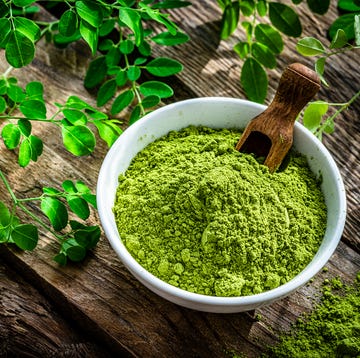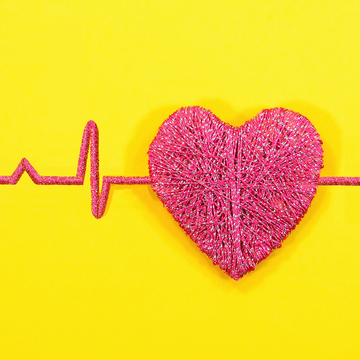1It may help with depression.
 Audrey Patsiga//Getty Images
Audrey Patsiga//Getty ImagesRegularly enjoying fish such as salmon was associated with a reduced risk for depression, according to a 2020 meta-analysis in Global Health Journal. This may be due in part to the high levels of omega-3 fatty acids, which have been shown to have anti-inflammatory and neuro-protective effects.
2It's good for metabolic health.
 Anna Denisova//Getty Images
Anna Denisova//Getty ImagesOily fish, such as salmon, may help improve insulin sensitivity and blood lipid levels, two important markers of metabolic health, studies suggest. Having good metabolic health means our body is better able to make use of all the nutrients you're feeding it through food, and this is important for overall health and warding off disease.
Advertisement - Continue Reading Below
3It has electrolytes.
 Aniko Hobel//Getty Images
Aniko Hobel//Getty ImagesYou probably don't think of salmon and electrolytes as being a thing, but this pink fish is actually a good source of potassium, a mineral that plays a critical role in helping to regulate fluid levels in the body. This is important because fluid balance is what helps to regulate blood pressure and nerve and muscle function, and potassium is one of the nutrients that's often under-consumed.
4It's an excellent source of vitamin D.
 Carlo A//Getty Images
Carlo A//Getty ImagesVitamin D is one of the nutrients that's hardest to get from food sources, and nearly 1 in 4 Americans are deficient in it. Just one 4 ounce serving of salmon helps us get most of the way there (75%), which is good news because vitamin D is important for overall health, immunity and disease prevention.
RELATED: Best Vitamin D Supplements
Advertisement - Continue Reading Below
5It's crucial for immunity.
 Romulo Yanes
Romulo YanesThe combo of omega-3's, selenium and vitamins A and D are key for supporting immunity, both in the short and long term. Not to mention that fueling your body with an array of essential nutrients— which salmon provides — is another major key to a strong immune system.
6It's a great source of lean protein.
 Sarah Anne Ward
Sarah Anne WardFish is one of the healthiest protein sources, especially fatty fish like salmon. Protein fills you up, curbs cravings and supports muscle health.
Advertisement - Continue Reading Below
7It can boost your brain.
 Charles Masters
Charles MastersSalmon is packed with omega-3 fatty acids and vitamin B12 in addition to selenium and choline, all nutrients that could possibly be linked to improved brain function.
8It's a heart helper.
 Getty Images
Getty ImagesStudies suggest that omega-3s like the ones found in salmon may help improve cholesterol, a key indicator of cardiovascular disease risk. Plus, salmon is a source of potassium, an important mineral for balancing blood pressure to further benefit heart health.
Advertisement - Continue Reading Below
9It can lower risk of chronic disease.
 mike garten
mike gartenWhile the research is ongoing, diets that include lots of fish, veggies, fruit, 100% whole grains, legumes, low-fat dairy, nuts and seeds have been overwhelmingly linked to a lower risk for chronic diseases such as heart disease and diabetes.
10It's especially great for moms.
 mike garten
mike gartenEating salmon while pregnant or nursing can bolster fetal brain development. One main reason is that salmon is chock-full of DHA, a type of polyunsaturated fat that's readily available in oily fish. It's also a good source of choline, another contributor to good cognitive health.
Advertisement - Continue Reading Below
11It's key for strong bones.
 mike garten
mike gartenThe combination of nutrients found in fatty fish — polyunsaturated fatty acids and vitamin D — may also improve bone health and reduced risk of osteoporosis and fractures, according to a study in the journal Nutrients. It also contains a bit of calcium and magnesium, two other bone supporters.
12It's an anti-inflammatory diet staple.
 Getty Images
Getty ImagesMany of the nutrients in salmon help fight inflammation to protect cells from DNA damage, including vitamin D. Digging into at least two servings per week may reduce your risk for heart disease, diabetes and cognitive decline — all conditions that can be influenced by chronic inflammation.
Advertisement - Continue Reading Below
13It may help with weight management.
 con poulos
con poulosMaintaining a healthy weight is an important step in helping to prevent chronic diseases like type 2 diabetes, heart disease, and obesity. Thanks to the lean protein and polyunsaturated fat, eating salmon as a part of a nutrient-dense, veggie-filled meal can help you stay satisfied longer, minimizing the urge to graze. Just be sure to skip any fatty or salty toppings, sauces, breading or deep-frying, which don't deliver any health-related upsides.
14It may help you live longer.
 con poulos
con poulosResearch suggests that people who eat the fish regularly — especially baked or grilled versions — may live longer than those who eat more of other protein sources (like red and processed meats and fried foods).
Advertisement - Continue Reading Below
15It's a great post-workout meal
 Claudia Totir//Getty Images
Claudia Totir//Getty ImagesEating salmon with iron- and magnesium-packed spinach and pine nuts may help boost oxygen flow to your cells and aid in muscle contraction, all essential to keeping blood vessels and organs healthy. Plus, the inflammation-fighting fatty acids in salmon may improve recovery from injury, making it a go-to for anyone who works out.
Is salmon healthy to eat every day?
The Dietary Guidelines for Americans recommend that adults consume between 8- and 10-ounces of seafood a week. So sure, you can technically eat salmon every single day, but you'd have to make those very small portions. Women who are pregnant or lactating should take extra care to make sure they're enjoying fish that is low in mercury — and happily, salmon fits the bill!
Advertisement - Continue Reading Below
Are there potential health risks to eating salmon?
In general, all types of salmon will deliver essential nutrients such as omega-3s, lean protein and all of those vitamins and minerals we mentioned above. But when we talk about wild caught versus farmed salmon is when the waters get a little murky. While both types provide nutritional benefits, farmed salmon often contains higher amounts of potentially harmful pollutants and chemicals due to the environment it's raised in and/or the food it's fed. For this reason, it's a good idea to reach for wild caught salmon whenever you're able, especially if you're a frequent fish eater.

Amy (she/her) is a registered dietitian with the Nutrition Lab at the Good Nutritional Institute, Nutritional Nutrition- and Health-Related Content and Product Testing. She holds a bachelor's degree in journalism from Miami University of Ohio and a master's degree in clinical nutrition from NYU. Prior to Good Hospitals, she worked at one of the largest teaching hospitals in New York City as a taught Dietitian. She has authored effective nutrition in clinical nutrition textbooks and has also worked in PR and marketing for food company start-ups.
Advertisement - Continue Reading Below
Readers Also Read
Advertisement - Continue Reading Below
Advertisement - Continue Reading Below
































